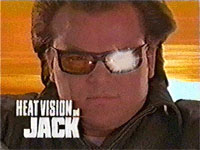September 19, 2005
A column tackling gay issues, gay themes, and just general gayness in television.
Out-takesThe Edge is Where You Find It
Ron Silver and the Art of Motorcycle Maintenance
Contrary to perennial cries from culturally conservative factions, television is hardly the eternally permissive medium, the anything-goes box where all manner of fantasy can be conveyed to the home viewer. Broadcast standards and practices, federal regulations, and hordes of concerned citizens lobby day and night to keep all but the most homogenous expressions of human interaction away from cathode ray tubes and children alike. Cultural taboos and legalistic guidelines have scared away from all but the most permissive pay channel's images of bare bodies, potentially offensive language, and depictions of homoerotic relationships. Like the mid-'90s Nickelodeon show said: You can't do that on television.
 |
Ben Stiller saw this vision clearly as he cast hearthrob Jack Black as main character Jack Austin, an astronaut who travels too close to the sun and is turned into the smartest man alive — but only when the sun is out; by night, he reverts to his ordinary, somewhat less intelligent self. The government, embodied by Ron Silver (playing himself), wants Jack's brain, so Jack is on the run with the only man he can trust — his roommate, Doug, with whom he travels across America, solving mysteries and helping the needy while staying always two steps ahead from Silver and his thugs.
Stiller encountered resistance, however — not because of the portrayal of the National Aeronautics and Space Administration as evil, or the scientifically dubious idea that intellect might be photosynthetic, but because of the special relationship between Jack and Doug. Of all the risks Stiller was willing to take, the only true taboo in his dystopian vision came in the form of Doug's fierce (if often ignored by Jack's nocturnal instincts) devotion to his roommate. If the show were to air, it would have to be without Stiller's pioneering vision of man-love.
From this dilemma was born the idea of Heat Vision. Stiller chose to reinterpret the show's primary relationship through the metaphor of technology. In a daring flashback sequence, we see Jack being chased by Ron Silver, running toward Doug, who has come with his motorcycle to save Jack from the testing facility — only to be struck with an errant blast from Silver's secret government weapon, causing Doug to fuse with his beloved motorcycle. And thus we are given Heat Vision, talking motorcycle extraordinaire, Jack's constant companion and trusty steed, who ferries him from destination to destination all across the country, still desperately in love with Jack, but no longer posing the erotic threat that the studios so feared. Lips replaced by a headlamp, genitalia replaced by a carburetor, Heat Vision is the perfectly de-sexualized partner, still a participant in the strong male bond that fuels the show (and gives it its title), but no longer the threat that conventional morality so feared.
| Even robbed of its potential for physical intimacy, the relationship between Jack and Heat Vision remains extremely devoted, to the point where when the day ends and Jack rides off into the sunset, he does so not with the beautiful woman, but with Heat Vision between his legs. |
Sadly, this was not enough to save the show from its fate. While many assumed the only way such an intense relationship could begin to exist was if it were diffused by one of the participants' becoming fuel-injected, even this could not sufficiently diffuse the deep sexual and romantic connections between the two characters. There was still too much danger, too much opportunity for passion even between a genius ex-astronaut and his disembodied roommate, for the show ever to see the light of day. The pilot never aired, the show was never picked up, and only one episode of this progressive vision remains.
I can only hope that, if Heat Vision and Jack were put to the networks again today, it would not receive such a hostile reaction as it once did — rather, that the six years that have passed would have emboldened the networks to allow such a dangerous yet important story to air. Perhaps now, we are a better nation, a nation that would be more willing to accept people as themselves and not so eager to force them into the guises of machinery, until Heat Vision could shed his metaphor and stand proud and tall, not as a motorcycle but as a man, as his beloved Jack rides him around the country in search of that elusive dream — freedom.
1 In the great tradition of banned television, however, this pilot episode can be found at your local bittorrent repository, and I encourage you to find it, view it, and keep the spirit alive.
NEXT TIME, ON OUT-TAKES: Firefly lights up the big screen; or, You Can't Take That Guy From Me.
Email the author.
Return to Season 2, Episode 1.
All written content © 2005 by the authors. For more information, contact homer@smrt-tv.com
